
Boys and Girls, Iíve achieved Asian film nirvana. I had the amazing honour of an exclusive chat with legendary director John Woo. The man responsible for so many iconic moments in Hong Kong action films like A Better Tomorrow (I & II), The Killer, Bullet in the Head and the Hollywood production, Face/Off, sat down to talk about his latest film, the epic Red Cliff, based on the classic Chinese tale, The Romance of the Three Kingdoms.
During a Q&A at the Asia Society before our interview, Mr. Woo informed the crowd of Chow Yun Fatís last-minute flight from Red Cliff and Tony Leungís heroic recasting and discussed the importance of doves and expensive CGI. After professing his ardent love of movie musicals, Mr. Woo revealed three important things about himself: 1) He has never held a real gun. 2) He doesnít know how to drive. 3) He does a mean cha-cha-cha.
Dig it!
John Woo
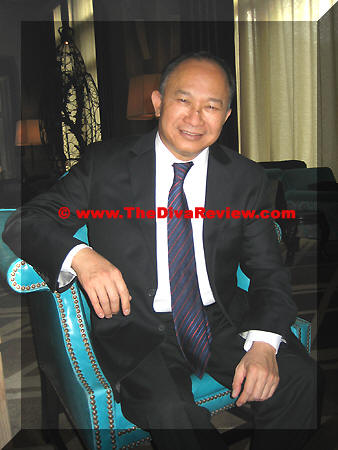 The
Lady Miz Diva: Red Cliff has been cut down from two films to one in the
US. Were you worried about the audience missing some points in the
story or background on the characters?
The
Lady Miz Diva: Red Cliff has been cut down from two films to one in the
US. Were you worried about the audience missing some points in the
story or background on the characters?
John Woo: Did you feel that?
LMD: I felt the beginning was a little rushed. Having seen Red Cliff: Part 1 previously, we donít get to learn as much about those classic characters.
JW: I think the American audience is not as familiar with our history and the characters, so we decided to focus on the main storyline and the key characters. Thatís what we were trying to do. And we were trying to find a way to get the story and the background, the characters right away without any trouble, you know? We did a lot of work, therefore. The main question is how to do the cut without hurting the movie and also keep the same kind of message, and also so the audience can enjoy the action sequences and understand the strategy and war technique without any confusion. The good thing for the shorter version is we kept the full love story. Actually, we didnít lose much; we just trimmed down all the side charactersí role. We kept in the message, the anti-war message.
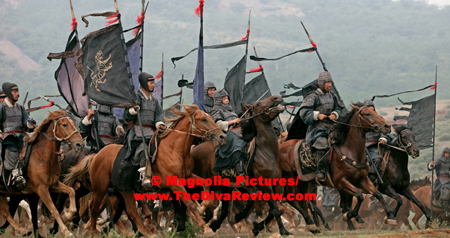 LMD:
I wondered if that anti-war message is what drew you to make a film
based on The Romance of the Three Kingdoms at this particular time with
all the troubles across the world?
LMD:
I wondered if that anti-war message is what drew you to make a film
based on The Romance of the Three Kingdoms at this particular time with
all the troubles across the world?
JW: Yes, youíre right, because it always makes me feel so sad that people are still killing each other. I really care about the world. I really care about what happens to everyone. Like before we shot the film, when I realised the economy is getting worse and that will affect so many people. I also hear about young people in Asia, they feel so frustrated because of that, all of a sudden they feel so lonely and not many people really care about them or do a thing about it. Some young people donít even know their futures, so itís made some young ones give up their lives. It affects them, the depression, itís happening in some of the Asian countries, even in Hong Kong, so I feel very upset about it. I think they all need to be encouraged. They need to know someone cares about them, so thatís why I made a six hour movie thatís about the weak overcoming the strongest. A much smaller army can defeat the larger and more powerful enemy through a combination of teamwork, vision, intelligence and courage. That made me want to make an encouraging movie and also make all the characters mortal, so especially the young people can relate to them. They can do it! We also can do it if we just try to work together and let them know they are not alone. There is always a friend. There is always a hope, just take the challenge to live on. So, thatís also what occurred to me to make the movie that way, so it had become not only a historical film, it had also something we are all concerned with nowadays. We all need to care more about the young people.
LMD: You have three of my favourite actors in your film (- Tony Leung Chiu-Wai, Takeshi Kaneshiro, & Chang Chen). Was there ever a point where you thought one of the actors might play another role? Did you allow them to interpret the roles as they wanted to?
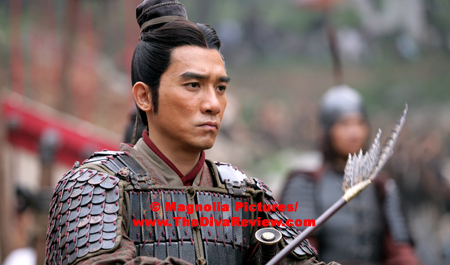 JW:
Yeah, I let them free. They feel free to do whatever they feel,
whatever they want. Thatís the way I work, I like to work with actors.
Tony, actually he was playing himself. Heís a wonderful man. Heís
gotten more mature and heís got a great heart. He always cares about
the others. Heís not that kind of a narrow-minded {person} as
books have written. Heís not selfish; heís very generous and charming.
He has become a real role model. He was perfect for the role; heís a
great leader and also an artist. Heís just got that special quality.
JW:
Yeah, I let them free. They feel free to do whatever they feel,
whatever they want. Thatís the way I work, I like to work with actors.
Tony, actually he was playing himself. Heís a wonderful man. Heís
gotten more mature and heís got a great heart. He always cares about
the others. Heís not that kind of a narrow-minded {person} as
books have written. Heís not selfish; heís very generous and charming.
He has become a real role model. He was perfect for the role; heís a
great leader and also an artist. Heís just got that special quality.
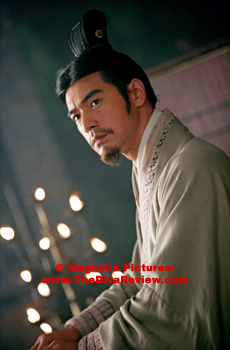 For
Takeshi, heís a man with a great energy. Heís just like the young men
nowadays, who have a great energy and so much self-confidence. He also
has a great sense of humour, thatís what I like. Heís a fantastic
actor, you know what I mean? Heís very smart and very creative, as
well. Sometimes he would improvise the dialog and heís very
professional and always listens. He knows what heís doing. Chang Chen,
heís very strong and a great personality.
For
Takeshi, heís a man with a great energy. Heís just like the young men
nowadays, who have a great energy and so much self-confidence. He also
has a great sense of humour, thatís what I like. Heís a fantastic
actor, you know what I mean? Heís very smart and very creative, as
well. Sometimes he would improvise the dialog and heís very
professional and always listens. He knows what heís doing. Chang Chen,
heís very strong and a great personality.
LMD: The women in Red Cliff are very important.
JW: Yes, yes, yes, that wasnít in the book.
LMD: Have you ever considered making a film with women as the protagonists?
JW: One of my next projects is gonna be a love story. Itís about the life of a woman in love with two men. I always wanted to make a love story. I always wanted to make a womenís story, but itís hard to get the people to believe in me since Iím established as an action director. Itís hard to make people believe I could make a good love story.
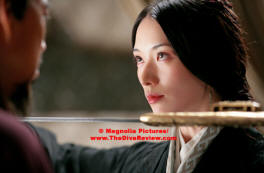 LMD:
Maybe after people see Red Cliff that will change, because the roles for
the two women are so wonderful. Chiling Lin was wonderful and as Zhao
Yuís wife.
LMD:
Maybe after people see Red Cliff that will change, because the roles for
the two women are so wonderful. Chiling Lin was wonderful and as Zhao
Yuís wife.
JW: Oh yeah, that was my idea because I wanted to show the classical woman, they got the beauty but they also have a strong personality. Sheís just like the women nowadays, very strong, independent, very brave and very smart. Sometimes they can do a better job than the men. {Laughs} So, thatís how I feel. And she looks so elegant.
LMD: Youíve mentioned being heavily influenced by musicals and how your scenes of violence are more choreographed like a dance. Would you like to make a musical some day?
JW: Of course, I have never given up the musical. Actually, I already have a wonderful script. Itís a very good script for a musical. Itís an action musical! {Laughs}
LMD: You also mentioned that you were a pretty good ballroom dancer, might we see you dance in a cameo?
JW: No, no, no, my legs.
LMD: What is next for you?
JW: Next is a World War II movie, The Flying Tigers. Itís gonna be an American and Chinese co-production. Weíre still working on the script. Itís almost finished.
LMD: You mentioned that Chow Yun Fat was meant to play Zhao Yu, but it didnít work out. Will you ever work with him again?
JW: Yes, definitely. Heís a good friend of mine, weíre still very good friends. I still respect him as one of the very best actors in the world. Of course, I really want to work with him again.
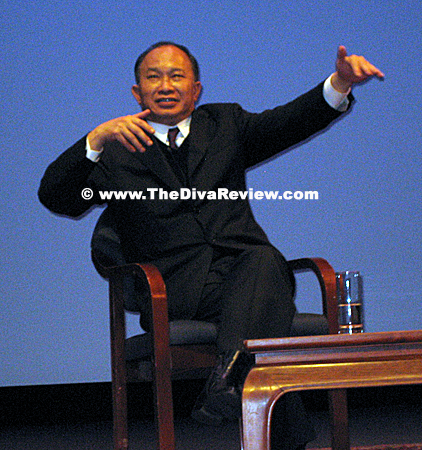 LMD:
Am I right in understanding that you meant to cut your signature doves
out of Red Cliff?
LMD:
Am I right in understanding that you meant to cut your signature doves
out of Red Cliff?
JW: Not cutting them out, I didnít want to use them again at the beginning. While we were working on the script, I came up with the idea to try and use them again. We thought to introduce the trip from both sides. Since we shot in three different locations, like the Red Cliff was on the south side of Beijing and the enemyís side was on the north side of some other city. So, that was a good way to use the dove to start the camera following from Red Cliff and across the river and revealing the enemyís battleships and their camp. Everybody loved that shot and loved that idea. Also, he has another message; heís really our hero, he just trying to send the peace message to the enemy. Thatís the whole idea. So I used it again and in the old times, they used the pigeon as a messenger. So again, I feel lucky, I was happy when I saw it, even though that shot had become one of the most expensive CG shots in film history.
LMD: Besides the doves, you have Tony with two swords and the back to back fighting and the slow motion shots; do you feel obligated to put those signature moments in? Will people get mad if they see a John Woo film without a ďJohn WooĒ scene?
JW: {Laughs} No, first of all, I tried to make the action seem more realistic. I didnít like to use any kung fu-type idea. But while we were on the set, when we were shooting the final battle sequence, my stunt team and my stunt coordinator, Cory Yuen, because they loved The Killer so much, he said, ďHey John, letís do something like The Killer!Ē Instead of two guns, we did the Mexican standoff with the swords, and we also put them back to back. Because they loved them {the films} so much, I said, ďOkay, okay.Ē They were my colleagues and my friends, so I said, ďAll right, letís do it.Ē
LMD: You had to.
JW: I had to.
~ The Lady Miz Diva
Oct 13th, 2009
Special thanks to the lovely La Frances Hui and the Asia Society of New York City for indispensable fabulousness.
© 2006-2022 The Diva Review.com
|
|












